Roles of Leaders and Managers in Business Operations: A Report
VerifiedAdded on 2023/01/06
|13
|4023
|25
Report
AI Summary
This report delves into the contrasting roles and functions of leaders and managers, highlighting their significance in organizational success, particularly within the context of Marks & Spencer. It meticulously defines and compares the responsibilities of leaders and managers, including planning, organizing, and motivating. The report further examines situational applications, such as conflict management and new product launches, demonstrating how leaders and managers adapt their approaches to different contexts. It also provides an in-depth analysis of various leadership theories, including situational, contingency, and system approaches, and evaluates their strengths and weaknesses. Furthermore, the report explores key approaches to operations management, emphasizing their importance in achieving business objectives and assessing the impact of external factors on decision-making. Through these analyses, the report offers valuable insights into effective leadership and management practices, contributing to enhanced productivity and profitability.
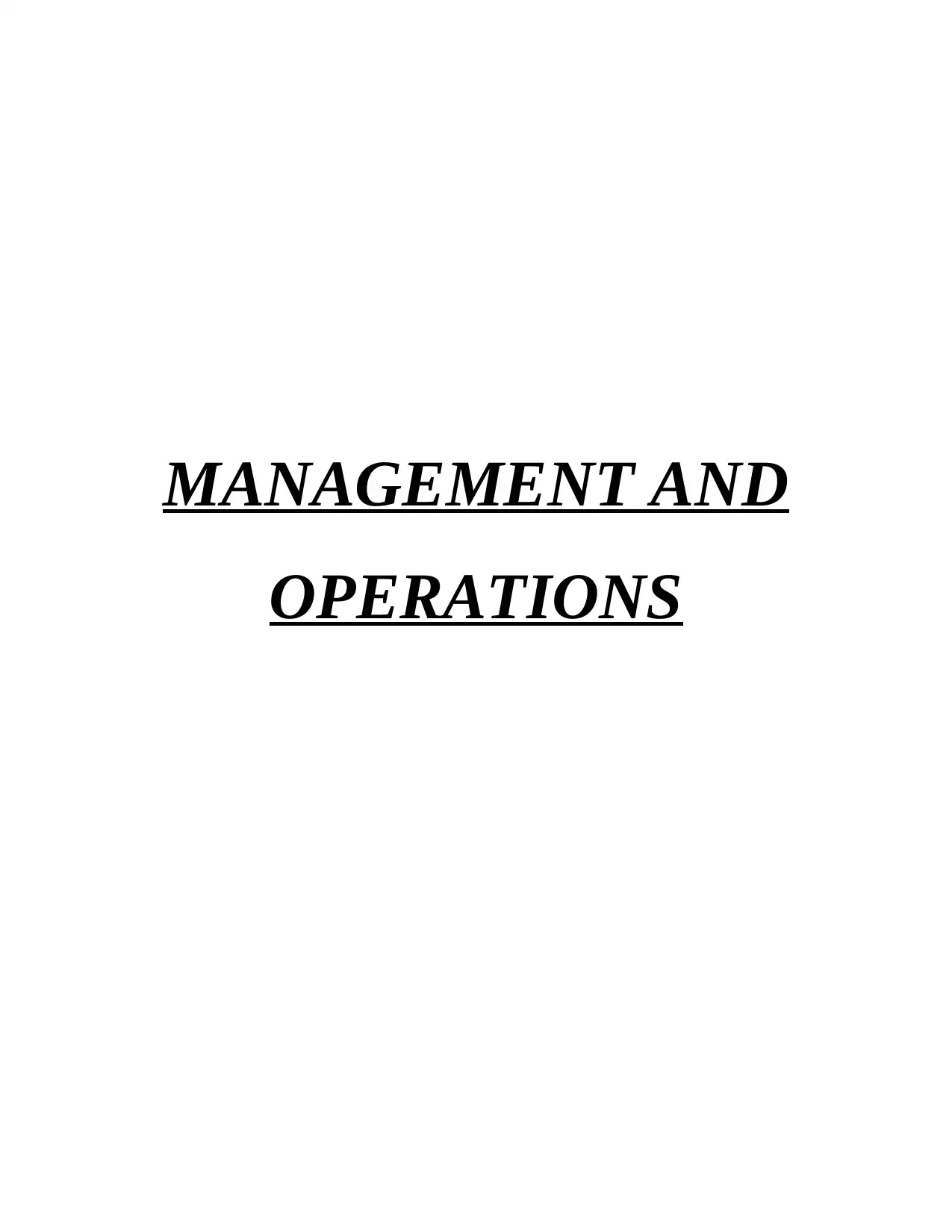
MANAGEMENT AND
OPERATIONS
OPERATIONS
Paraphrase This Document
Need a fresh take? Get an instant paraphrase of this document with our AI Paraphraser
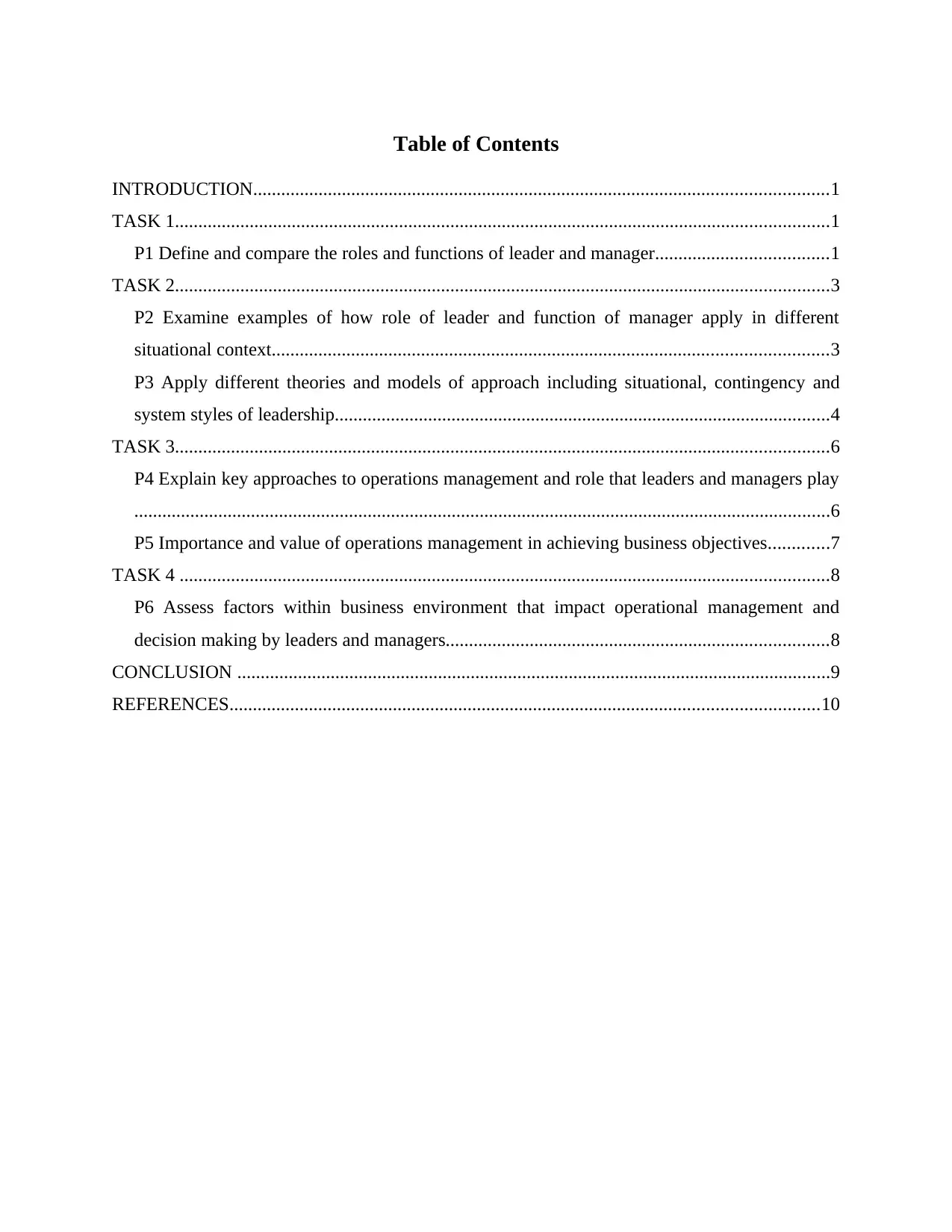
Table of Contents
INTRODUCTION...........................................................................................................................1
TASK 1............................................................................................................................................1
P1 Define and compare the roles and functions of leader and manager.....................................1
TASK 2............................................................................................................................................3
P2 Examine examples of how role of leader and function of manager apply in different
situational context.......................................................................................................................3
P3 Apply different theories and models of approach including situational, contingency and
system styles of leadership..........................................................................................................4
TASK 3............................................................................................................................................6
P4 Explain key approaches to operations management and role that leaders and managers play
.....................................................................................................................................................6
P5 Importance and value of operations management in achieving business objectives.............7
TASK 4 ...........................................................................................................................................8
P6 Assess factors within business environment that impact operational management and
decision making by leaders and managers..................................................................................8
CONCLUSION ...............................................................................................................................9
REFERENCES..............................................................................................................................10
INTRODUCTION...........................................................................................................................1
TASK 1............................................................................................................................................1
P1 Define and compare the roles and functions of leader and manager.....................................1
TASK 2............................................................................................................................................3
P2 Examine examples of how role of leader and function of manager apply in different
situational context.......................................................................................................................3
P3 Apply different theories and models of approach including situational, contingency and
system styles of leadership..........................................................................................................4
TASK 3............................................................................................................................................6
P4 Explain key approaches to operations management and role that leaders and managers play
.....................................................................................................................................................6
P5 Importance and value of operations management in achieving business objectives.............7
TASK 4 ...........................................................................................................................................8
P6 Assess factors within business environment that impact operational management and
decision making by leaders and managers..................................................................................8
CONCLUSION ...............................................................................................................................9
REFERENCES..............................................................................................................................10
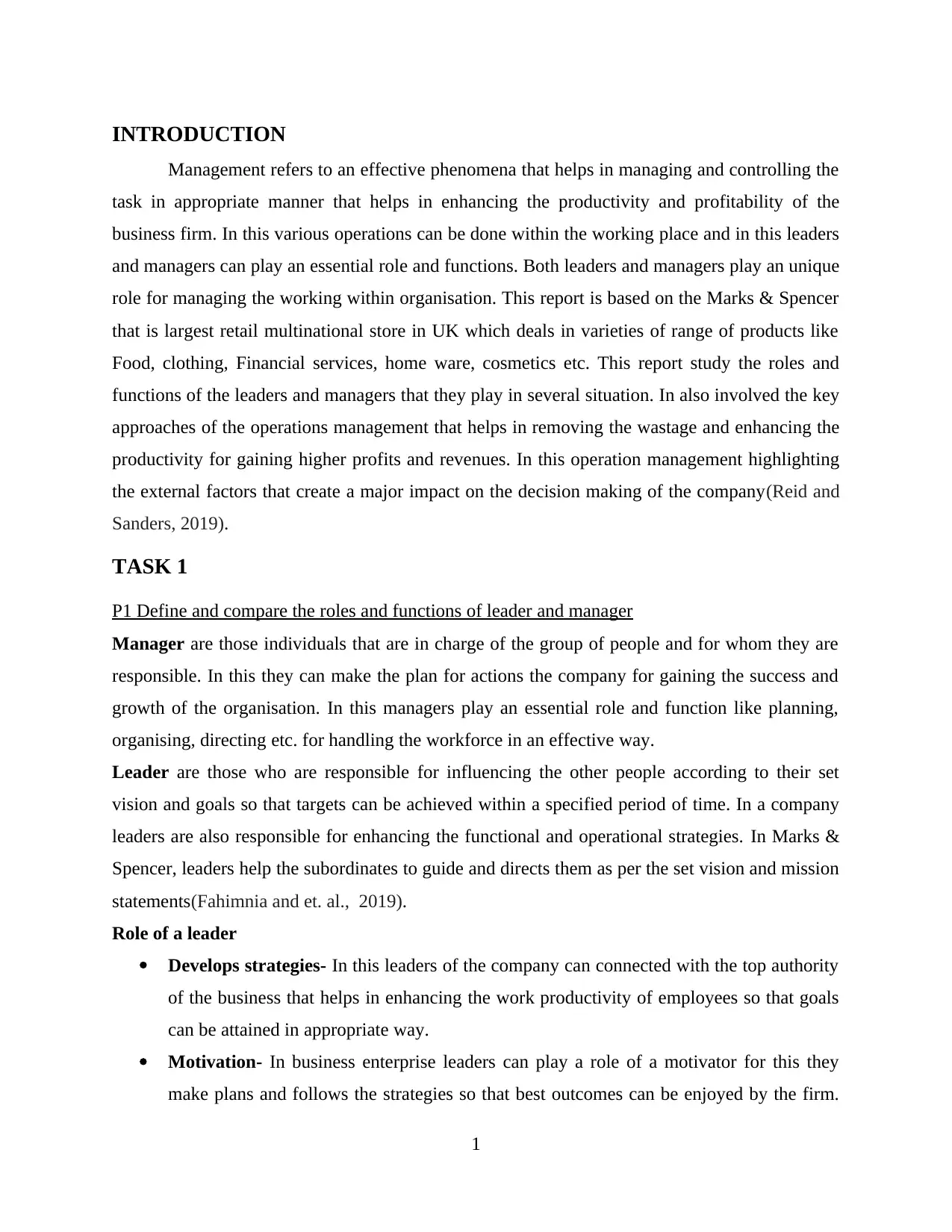
INTRODUCTION
Management refers to an effective phenomena that helps in managing and controlling the
task in appropriate manner that helps in enhancing the productivity and profitability of the
business firm. In this various operations can be done within the working place and in this leaders
and managers can play an essential role and functions. Both leaders and managers play an unique
role for managing the working within organisation. This report is based on the Marks & Spencer
that is largest retail multinational store in UK which deals in varieties of range of products like
Food, clothing, Financial services, home ware, cosmetics etc. This report study the roles and
functions of the leaders and managers that they play in several situation. In also involved the key
approaches of the operations management that helps in removing the wastage and enhancing the
productivity for gaining higher profits and revenues. In this operation management highlighting
the external factors that create a major impact on the decision making of the company(Reid and
Sanders, 2019).
TASK 1
P1 Define and compare the roles and functions of leader and manager
Manager are those individuals that are in charge of the group of people and for whom they are
responsible. In this they can make the plan for actions the company for gaining the success and
growth of the organisation. In this managers play an essential role and function like planning,
organising, directing etc. for handling the workforce in an effective way.
Leader are those who are responsible for influencing the other people according to their set
vision and goals so that targets can be achieved within a specified period of time. In a company
leaders are also responsible for enhancing the functional and operational strategies. In Marks &
Spencer, leaders help the subordinates to guide and directs them as per the set vision and mission
statements(Fahimnia and et. al., 2019).
Role of a leader
Develops strategies- In this leaders of the company can connected with the top authority
of the business that helps in enhancing the work productivity of employees so that goals
can be attained in appropriate way.
Motivation- In business enterprise leaders can play a role of a motivator for this they
make plans and follows the strategies so that best outcomes can be enjoyed by the firm.
1
Management refers to an effective phenomena that helps in managing and controlling the
task in appropriate manner that helps in enhancing the productivity and profitability of the
business firm. In this various operations can be done within the working place and in this leaders
and managers can play an essential role and functions. Both leaders and managers play an unique
role for managing the working within organisation. This report is based on the Marks & Spencer
that is largest retail multinational store in UK which deals in varieties of range of products like
Food, clothing, Financial services, home ware, cosmetics etc. This report study the roles and
functions of the leaders and managers that they play in several situation. In also involved the key
approaches of the operations management that helps in removing the wastage and enhancing the
productivity for gaining higher profits and revenues. In this operation management highlighting
the external factors that create a major impact on the decision making of the company(Reid and
Sanders, 2019).
TASK 1
P1 Define and compare the roles and functions of leader and manager
Manager are those individuals that are in charge of the group of people and for whom they are
responsible. In this they can make the plan for actions the company for gaining the success and
growth of the organisation. In this managers play an essential role and function like planning,
organising, directing etc. for handling the workforce in an effective way.
Leader are those who are responsible for influencing the other people according to their set
vision and goals so that targets can be achieved within a specified period of time. In a company
leaders are also responsible for enhancing the functional and operational strategies. In Marks &
Spencer, leaders help the subordinates to guide and directs them as per the set vision and mission
statements(Fahimnia and et. al., 2019).
Role of a leader
Develops strategies- In this leaders of the company can connected with the top authority
of the business that helps in enhancing the work productivity of employees so that goals
can be attained in appropriate way.
Motivation- In business enterprise leaders can play a role of a motivator for this they
make plans and follows the strategies so that best outcomes can be enjoyed by the firm.
1
⊘ This is a preview!⊘
Do you want full access?
Subscribe today to unlock all pages.

Trusted by 1+ million students worldwide
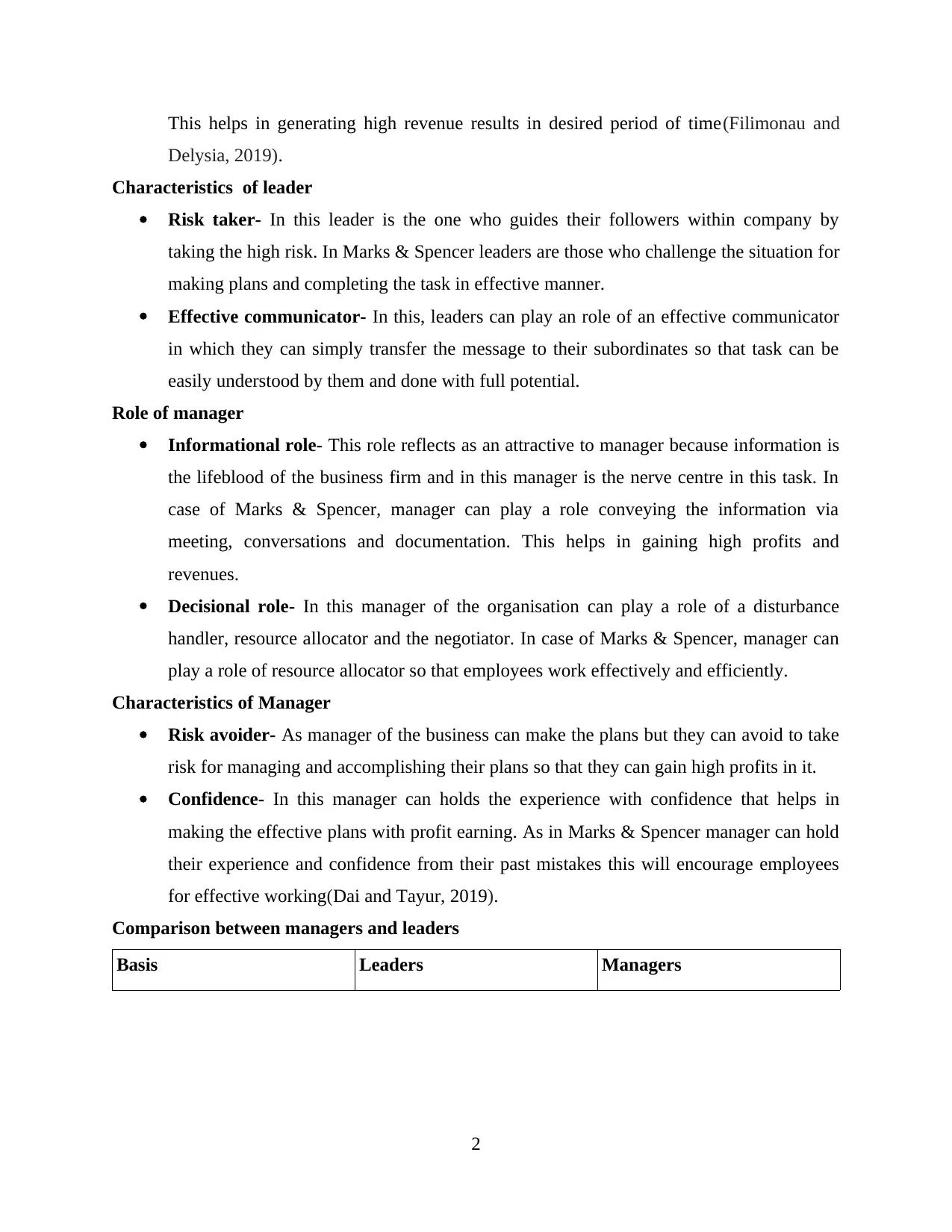
This helps in generating high revenue results in desired period of time(Filimonau and
Delysia, 2019).
Characteristics of leader
Risk taker- In this leader is the one who guides their followers within company by
taking the high risk. In Marks & Spencer leaders are those who challenge the situation for
making plans and completing the task in effective manner.
Effective communicator- In this, leaders can play an role of an effective communicator
in which they can simply transfer the message to their subordinates so that task can be
easily understood by them and done with full potential.
Role of manager
Informational role- This role reflects as an attractive to manager because information is
the lifeblood of the business firm and in this manager is the nerve centre in this task. In
case of Marks & Spencer, manager can play a role conveying the information via
meeting, conversations and documentation. This helps in gaining high profits and
revenues.
Decisional role- In this manager of the organisation can play a role of a disturbance
handler, resource allocator and the negotiator. In case of Marks & Spencer, manager can
play a role of resource allocator so that employees work effectively and efficiently.
Characteristics of Manager
Risk avoider- As manager of the business can make the plans but they can avoid to take
risk for managing and accomplishing their plans so that they can gain high profits in it.
Confidence- In this manager can holds the experience with confidence that helps in
making the effective plans with profit earning. As in Marks & Spencer manager can hold
their experience and confidence from their past mistakes this will encourage employees
for effective working(Dai and Tayur, 2019).
Comparison between managers and leaders
Basis Leaders Managers
2
Delysia, 2019).
Characteristics of leader
Risk taker- In this leader is the one who guides their followers within company by
taking the high risk. In Marks & Spencer leaders are those who challenge the situation for
making plans and completing the task in effective manner.
Effective communicator- In this, leaders can play an role of an effective communicator
in which they can simply transfer the message to their subordinates so that task can be
easily understood by them and done with full potential.
Role of manager
Informational role- This role reflects as an attractive to manager because information is
the lifeblood of the business firm and in this manager is the nerve centre in this task. In
case of Marks & Spencer, manager can play a role conveying the information via
meeting, conversations and documentation. This helps in gaining high profits and
revenues.
Decisional role- In this manager of the organisation can play a role of a disturbance
handler, resource allocator and the negotiator. In case of Marks & Spencer, manager can
play a role of resource allocator so that employees work effectively and efficiently.
Characteristics of Manager
Risk avoider- As manager of the business can make the plans but they can avoid to take
risk for managing and accomplishing their plans so that they can gain high profits in it.
Confidence- In this manager can holds the experience with confidence that helps in
making the effective plans with profit earning. As in Marks & Spencer manager can hold
their experience and confidence from their past mistakes this will encourage employees
for effective working(Dai and Tayur, 2019).
Comparison between managers and leaders
Basis Leaders Managers
2
Paraphrase This Document
Need a fresh take? Get an instant paraphrase of this document with our AI Paraphraser
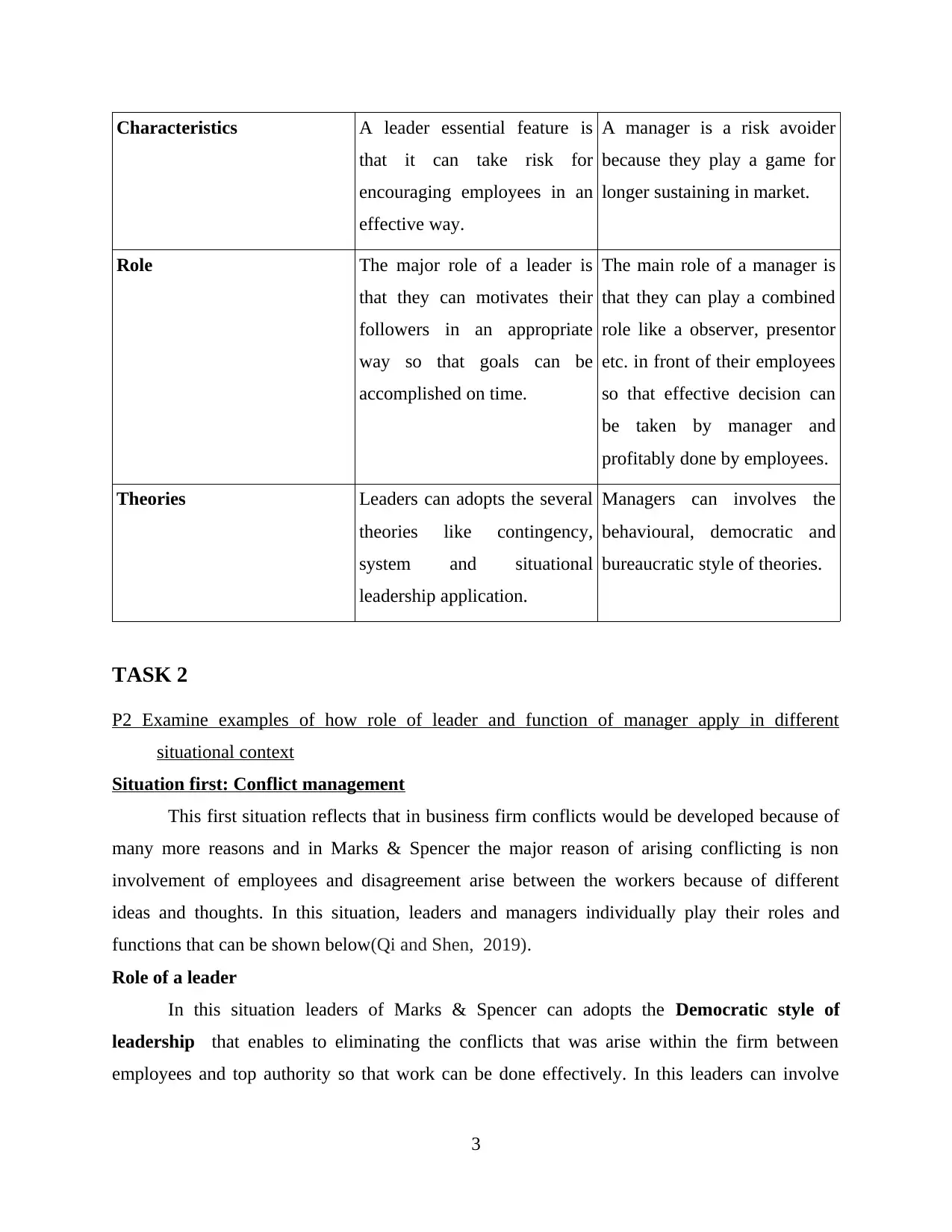
Characteristics A leader essential feature is
that it can take risk for
encouraging employees in an
effective way.
A manager is a risk avoider
because they play a game for
longer sustaining in market.
Role The major role of a leader is
that they can motivates their
followers in an appropriate
way so that goals can be
accomplished on time.
The main role of a manager is
that they can play a combined
role like a observer, presentor
etc. in front of their employees
so that effective decision can
be taken by manager and
profitably done by employees.
Theories Leaders can adopts the several
theories like contingency,
system and situational
leadership application.
Managers can involves the
behavioural, democratic and
bureaucratic style of theories.
TASK 2
P2 Examine examples of how role of leader and function of manager apply in different
situational context
Situation first: Conflict management
This first situation reflects that in business firm conflicts would be developed because of
many more reasons and in Marks & Spencer the major reason of arising conflicting is non
involvement of employees and disagreement arise between the workers because of different
ideas and thoughts. In this situation, leaders and managers individually play their roles and
functions that can be shown below(Qi and Shen, 2019).
Role of a leader
In this situation leaders of Marks & Spencer can adopts the Democratic style of
leadership that enables to eliminating the conflicts that was arise within the firm between
employees and top authority so that work can be done effectively. In this leaders can involve
3
that it can take risk for
encouraging employees in an
effective way.
A manager is a risk avoider
because they play a game for
longer sustaining in market.
Role The major role of a leader is
that they can motivates their
followers in an appropriate
way so that goals can be
accomplished on time.
The main role of a manager is
that they can play a combined
role like a observer, presentor
etc. in front of their employees
so that effective decision can
be taken by manager and
profitably done by employees.
Theories Leaders can adopts the several
theories like contingency,
system and situational
leadership application.
Managers can involves the
behavioural, democratic and
bureaucratic style of theories.
TASK 2
P2 Examine examples of how role of leader and function of manager apply in different
situational context
Situation first: Conflict management
This first situation reflects that in business firm conflicts would be developed because of
many more reasons and in Marks & Spencer the major reason of arising conflicting is non
involvement of employees and disagreement arise between the workers because of different
ideas and thoughts. In this situation, leaders and managers individually play their roles and
functions that can be shown below(Qi and Shen, 2019).
Role of a leader
In this situation leaders of Marks & Spencer can adopts the Democratic style of
leadership that enables to eliminating the conflicts that was arise within the firm between
employees and top authority so that work can be done effectively. In this leaders can involve
3
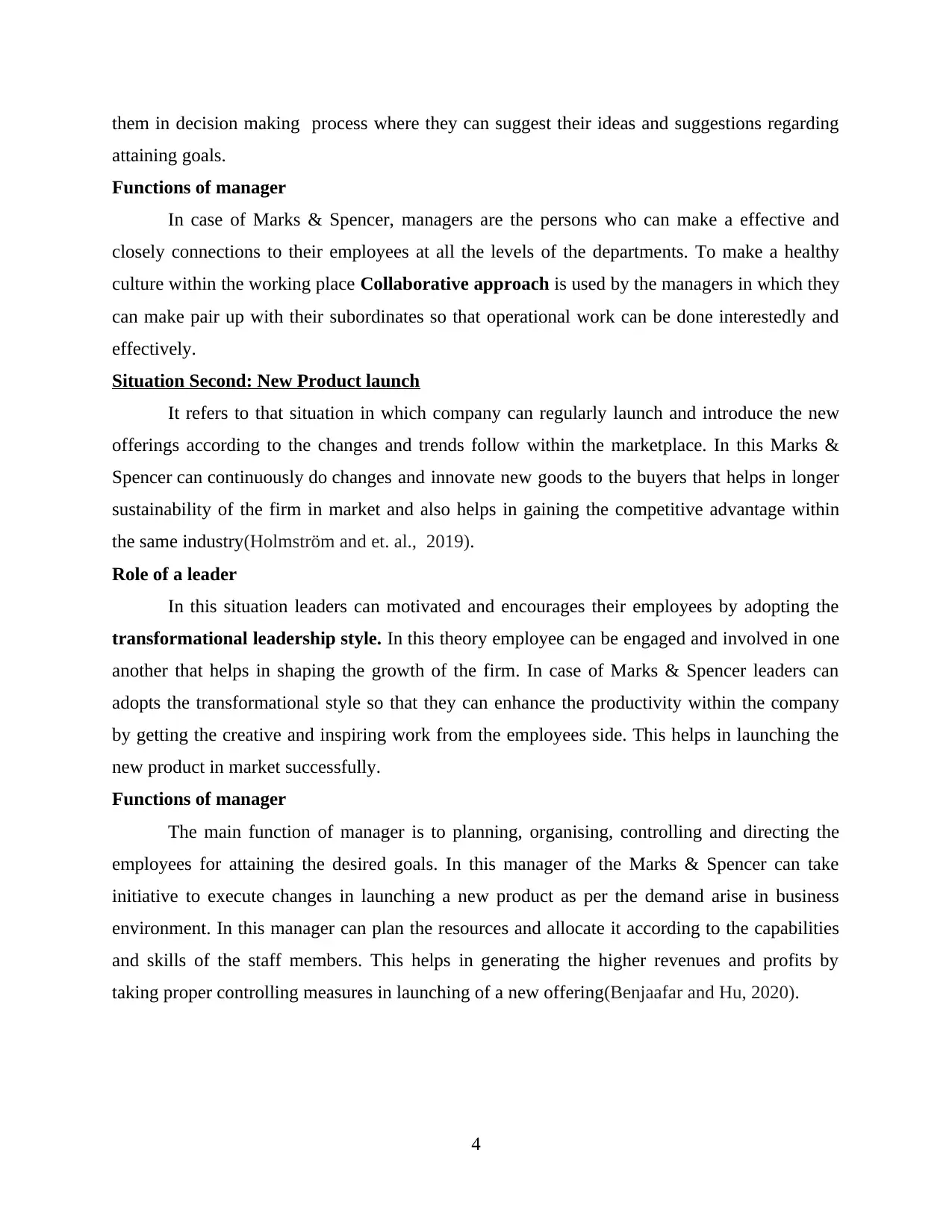
them in decision making process where they can suggest their ideas and suggestions regarding
attaining goals.
Functions of manager
In case of Marks & Spencer, managers are the persons who can make a effective and
closely connections to their employees at all the levels of the departments. To make a healthy
culture within the working place Collaborative approach is used by the managers in which they
can make pair up with their subordinates so that operational work can be done interestedly and
effectively.
Situation Second: New Product launch
It refers to that situation in which company can regularly launch and introduce the new
offerings according to the changes and trends follow within the marketplace. In this Marks &
Spencer can continuously do changes and innovate new goods to the buyers that helps in longer
sustainability of the firm in market and also helps in gaining the competitive advantage within
the same industry(Holmström and et. al., 2019).
Role of a leader
In this situation leaders can motivated and encourages their employees by adopting the
transformational leadership style. In this theory employee can be engaged and involved in one
another that helps in shaping the growth of the firm. In case of Marks & Spencer leaders can
adopts the transformational style so that they can enhance the productivity within the company
by getting the creative and inspiring work from the employees side. This helps in launching the
new product in market successfully.
Functions of manager
The main function of manager is to planning, organising, controlling and directing the
employees for attaining the desired goals. In this manager of the Marks & Spencer can take
initiative to execute changes in launching a new product as per the demand arise in business
environment. In this manager can plan the resources and allocate it according to the capabilities
and skills of the staff members. This helps in generating the higher revenues and profits by
taking proper controlling measures in launching of a new offering(Benjaafar and Hu, 2020).
4
attaining goals.
Functions of manager
In case of Marks & Spencer, managers are the persons who can make a effective and
closely connections to their employees at all the levels of the departments. To make a healthy
culture within the working place Collaborative approach is used by the managers in which they
can make pair up with their subordinates so that operational work can be done interestedly and
effectively.
Situation Second: New Product launch
It refers to that situation in which company can regularly launch and introduce the new
offerings according to the changes and trends follow within the marketplace. In this Marks &
Spencer can continuously do changes and innovate new goods to the buyers that helps in longer
sustainability of the firm in market and also helps in gaining the competitive advantage within
the same industry(Holmström and et. al., 2019).
Role of a leader
In this situation leaders can motivated and encourages their employees by adopting the
transformational leadership style. In this theory employee can be engaged and involved in one
another that helps in shaping the growth of the firm. In case of Marks & Spencer leaders can
adopts the transformational style so that they can enhance the productivity within the company
by getting the creative and inspiring work from the employees side. This helps in launching the
new product in market successfully.
Functions of manager
The main function of manager is to planning, organising, controlling and directing the
employees for attaining the desired goals. In this manager of the Marks & Spencer can take
initiative to execute changes in launching a new product as per the demand arise in business
environment. In this manager can plan the resources and allocate it according to the capabilities
and skills of the staff members. This helps in generating the higher revenues and profits by
taking proper controlling measures in launching of a new offering(Benjaafar and Hu, 2020).
4
⊘ This is a preview!⊘
Do you want full access?
Subscribe today to unlock all pages.

Trusted by 1+ million students worldwide
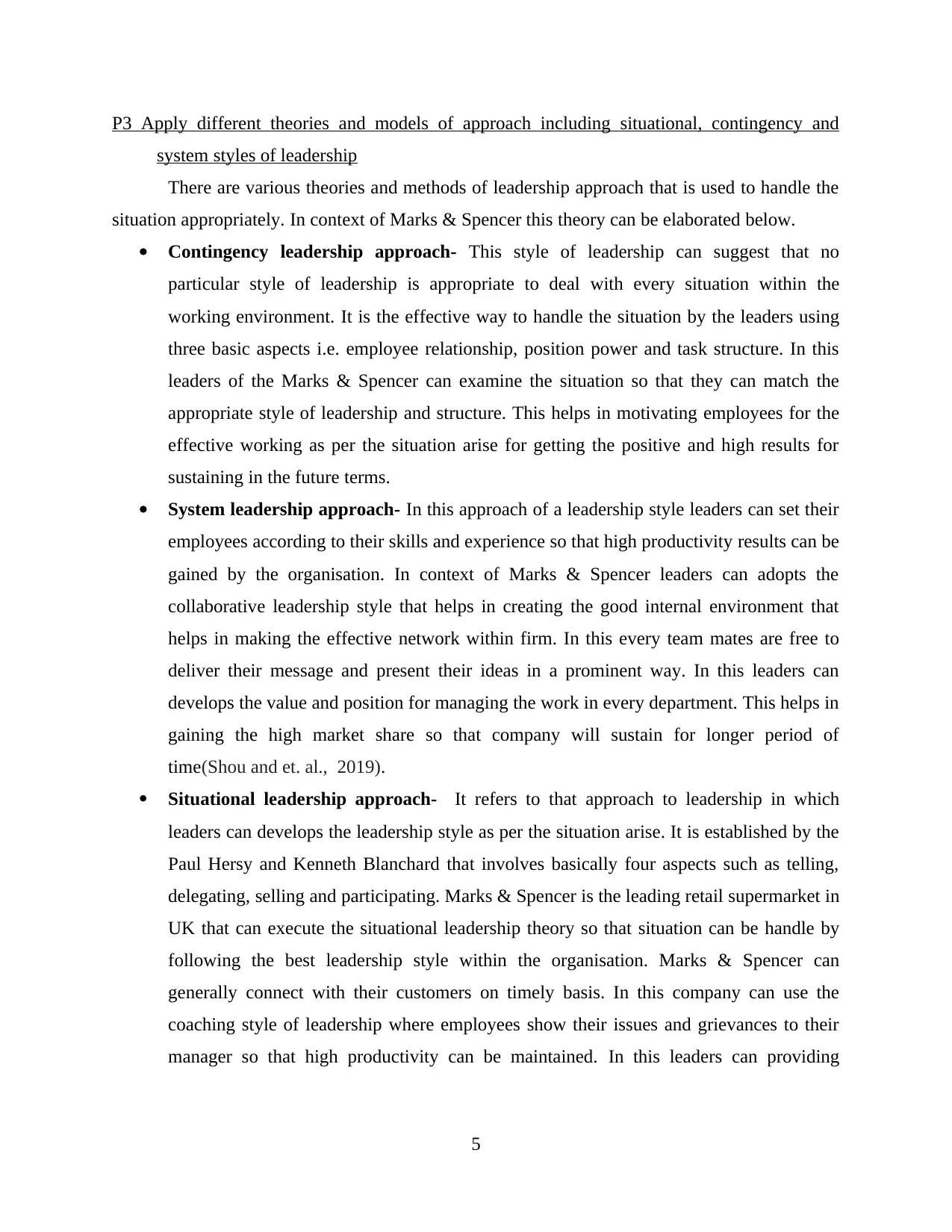
P3 Apply different theories and models of approach including situational, contingency and
system styles of leadership
There are various theories and methods of leadership approach that is used to handle the
situation appropriately. In context of Marks & Spencer this theory can be elaborated below.
Contingency leadership approach- This style of leadership can suggest that no
particular style of leadership is appropriate to deal with every situation within the
working environment. It is the effective way to handle the situation by the leaders using
three basic aspects i.e. employee relationship, position power and task structure. In this
leaders of the Marks & Spencer can examine the situation so that they can match the
appropriate style of leadership and structure. This helps in motivating employees for the
effective working as per the situation arise for getting the positive and high results for
sustaining in the future terms.
System leadership approach- In this approach of a leadership style leaders can set their
employees according to their skills and experience so that high productivity results can be
gained by the organisation. In context of Marks & Spencer leaders can adopts the
collaborative leadership style that helps in creating the good internal environment that
helps in making the effective network within firm. In this every team mates are free to
deliver their message and present their ideas in a prominent way. In this leaders can
develops the value and position for managing the work in every department. This helps in
gaining the high market share so that company will sustain for longer period of
time(Shou and et. al., 2019).
Situational leadership approach- It refers to that approach to leadership in which
leaders can develops the leadership style as per the situation arise. It is established by the
Paul Hersy and Kenneth Blanchard that involves basically four aspects such as telling,
delegating, selling and participating. Marks & Spencer is the leading retail supermarket in
UK that can execute the situational leadership theory so that situation can be handle by
following the best leadership style within the organisation. Marks & Spencer can
generally connect with their customers on timely basis. In this company can use the
coaching style of leadership where employees show their issues and grievances to their
manager so that high productivity can be maintained. In this leaders can providing
5
system styles of leadership
There are various theories and methods of leadership approach that is used to handle the
situation appropriately. In context of Marks & Spencer this theory can be elaborated below.
Contingency leadership approach- This style of leadership can suggest that no
particular style of leadership is appropriate to deal with every situation within the
working environment. It is the effective way to handle the situation by the leaders using
three basic aspects i.e. employee relationship, position power and task structure. In this
leaders of the Marks & Spencer can examine the situation so that they can match the
appropriate style of leadership and structure. This helps in motivating employees for the
effective working as per the situation arise for getting the positive and high results for
sustaining in the future terms.
System leadership approach- In this approach of a leadership style leaders can set their
employees according to their skills and experience so that high productivity results can be
gained by the organisation. In context of Marks & Spencer leaders can adopts the
collaborative leadership style that helps in creating the good internal environment that
helps in making the effective network within firm. In this every team mates are free to
deliver their message and present their ideas in a prominent way. In this leaders can
develops the value and position for managing the work in every department. This helps in
gaining the high market share so that company will sustain for longer period of
time(Shou and et. al., 2019).
Situational leadership approach- It refers to that approach to leadership in which
leaders can develops the leadership style as per the situation arise. It is established by the
Paul Hersy and Kenneth Blanchard that involves basically four aspects such as telling,
delegating, selling and participating. Marks & Spencer is the leading retail supermarket in
UK that can execute the situational leadership theory so that situation can be handle by
following the best leadership style within the organisation. Marks & Spencer can
generally connect with their customers on timely basis. In this company can use the
coaching style of leadership where employees show their issues and grievances to their
manager so that high productivity can be maintained. In this leaders can providing
5
Paraphrase This Document
Need a fresh take? Get an instant paraphrase of this document with our AI Paraphraser
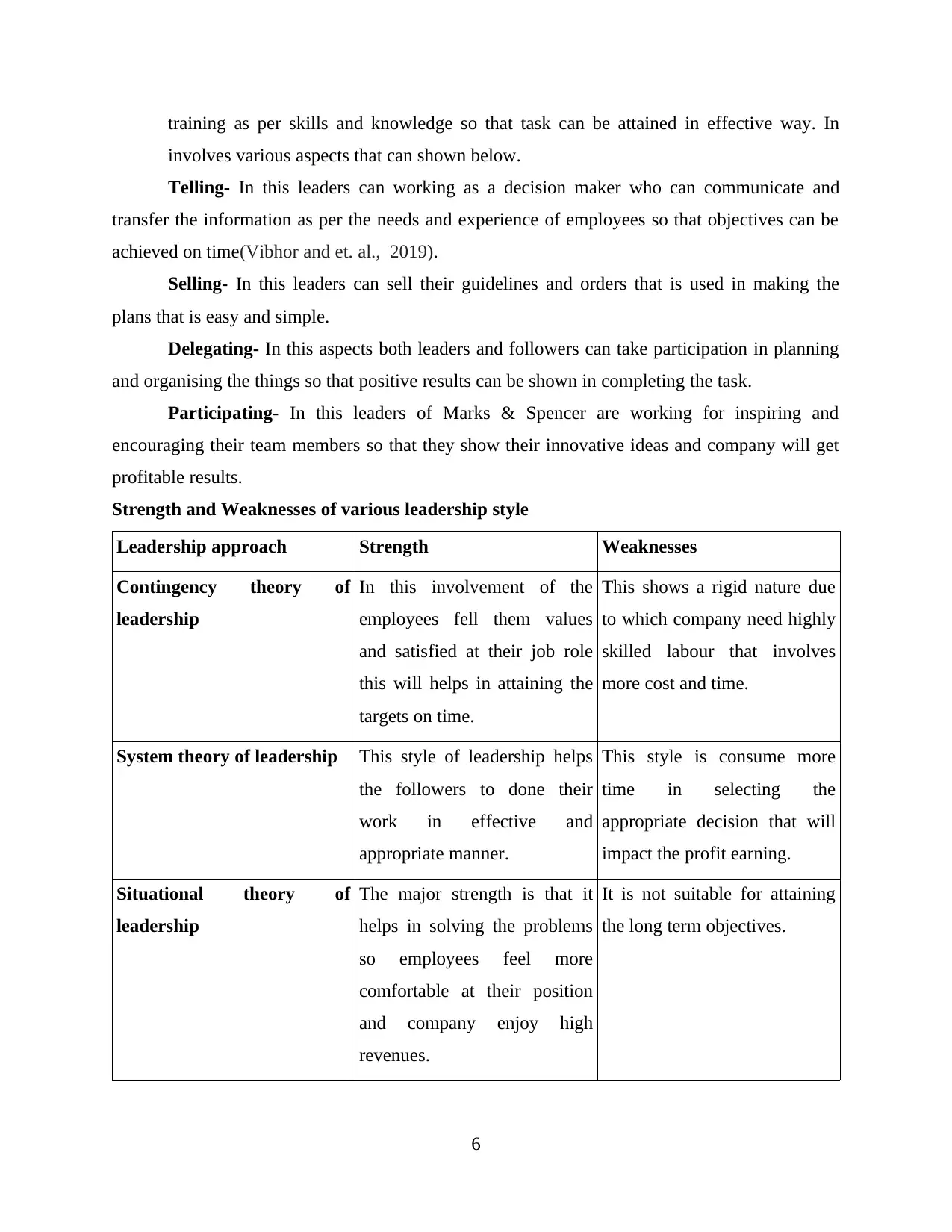
training as per skills and knowledge so that task can be attained in effective way. In
involves various aspects that can shown below.
Telling- In this leaders can working as a decision maker who can communicate and
transfer the information as per the needs and experience of employees so that objectives can be
achieved on time(Vibhor and et. al., 2019).
Selling- In this leaders can sell their guidelines and orders that is used in making the
plans that is easy and simple.
Delegating- In this aspects both leaders and followers can take participation in planning
and organising the things so that positive results can be shown in completing the task.
Participating- In this leaders of Marks & Spencer are working for inspiring and
encouraging their team members so that they show their innovative ideas and company will get
profitable results.
Strength and Weaknesses of various leadership style
Leadership approach Strength Weaknesses
Contingency theory of
leadership
In this involvement of the
employees fell them values
and satisfied at their job role
this will helps in attaining the
targets on time.
This shows a rigid nature due
to which company need highly
skilled labour that involves
more cost and time.
System theory of leadership This style of leadership helps
the followers to done their
work in effective and
appropriate manner.
This style is consume more
time in selecting the
appropriate decision that will
impact the profit earning.
Situational theory of
leadership
The major strength is that it
helps in solving the problems
so employees feel more
comfortable at their position
and company enjoy high
revenues.
It is not suitable for attaining
the long term objectives.
6
involves various aspects that can shown below.
Telling- In this leaders can working as a decision maker who can communicate and
transfer the information as per the needs and experience of employees so that objectives can be
achieved on time(Vibhor and et. al., 2019).
Selling- In this leaders can sell their guidelines and orders that is used in making the
plans that is easy and simple.
Delegating- In this aspects both leaders and followers can take participation in planning
and organising the things so that positive results can be shown in completing the task.
Participating- In this leaders of Marks & Spencer are working for inspiring and
encouraging their team members so that they show their innovative ideas and company will get
profitable results.
Strength and Weaknesses of various leadership style
Leadership approach Strength Weaknesses
Contingency theory of
leadership
In this involvement of the
employees fell them values
and satisfied at their job role
this will helps in attaining the
targets on time.
This shows a rigid nature due
to which company need highly
skilled labour that involves
more cost and time.
System theory of leadership This style of leadership helps
the followers to done their
work in effective and
appropriate manner.
This style is consume more
time in selecting the
appropriate decision that will
impact the profit earning.
Situational theory of
leadership
The major strength is that it
helps in solving the problems
so employees feel more
comfortable at their position
and company enjoy high
revenues.
It is not suitable for attaining
the long term objectives.
6
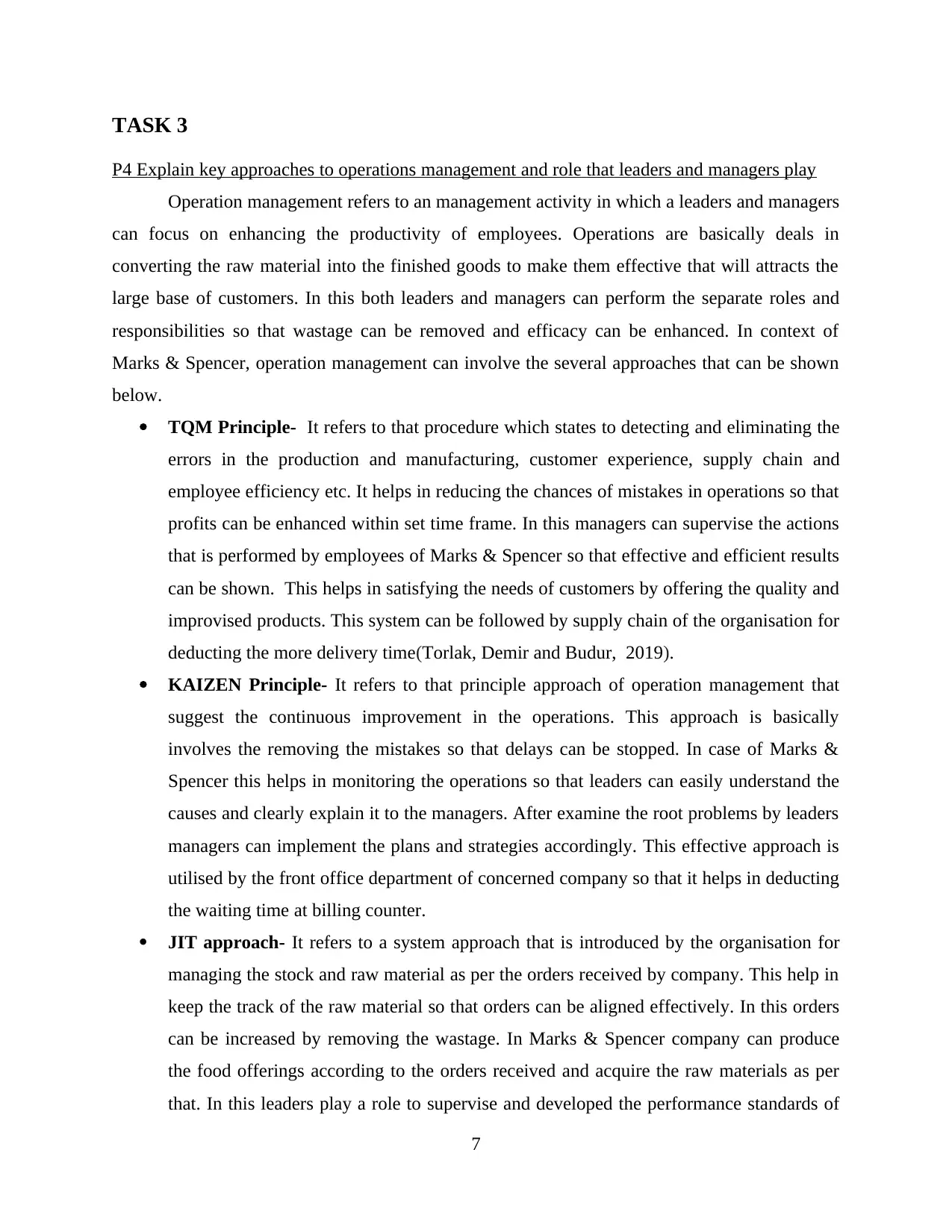
TASK 3
P4 Explain key approaches to operations management and role that leaders and managers play
Operation management refers to an management activity in which a leaders and managers
can focus on enhancing the productivity of employees. Operations are basically deals in
converting the raw material into the finished goods to make them effective that will attracts the
large base of customers. In this both leaders and managers can perform the separate roles and
responsibilities so that wastage can be removed and efficacy can be enhanced. In context of
Marks & Spencer, operation management can involve the several approaches that can be shown
below.
TQM Principle- It refers to that procedure which states to detecting and eliminating the
errors in the production and manufacturing, customer experience, supply chain and
employee efficiency etc. It helps in reducing the chances of mistakes in operations so that
profits can be enhanced within set time frame. In this managers can supervise the actions
that is performed by employees of Marks & Spencer so that effective and efficient results
can be shown. This helps in satisfying the needs of customers by offering the quality and
improvised products. This system can be followed by supply chain of the organisation for
deducting the more delivery time(Torlak, Demir and Budur, 2019).
KAIZEN Principle- It refers to that principle approach of operation management that
suggest the continuous improvement in the operations. This approach is basically
involves the removing the mistakes so that delays can be stopped. In case of Marks &
Spencer this helps in monitoring the operations so that leaders can easily understand the
causes and clearly explain it to the managers. After examine the root problems by leaders
managers can implement the plans and strategies accordingly. This effective approach is
utilised by the front office department of concerned company so that it helps in deducting
the waiting time at billing counter.
JIT approach- It refers to a system approach that is introduced by the organisation for
managing the stock and raw material as per the orders received by company. This help in
keep the track of the raw material so that orders can be aligned effectively. In this orders
can be increased by removing the wastage. In Marks & Spencer company can produce
the food offerings according to the orders received and acquire the raw materials as per
that. In this leaders play a role to supervise and developed the performance standards of
7
P4 Explain key approaches to operations management and role that leaders and managers play
Operation management refers to an management activity in which a leaders and managers
can focus on enhancing the productivity of employees. Operations are basically deals in
converting the raw material into the finished goods to make them effective that will attracts the
large base of customers. In this both leaders and managers can perform the separate roles and
responsibilities so that wastage can be removed and efficacy can be enhanced. In context of
Marks & Spencer, operation management can involve the several approaches that can be shown
below.
TQM Principle- It refers to that procedure which states to detecting and eliminating the
errors in the production and manufacturing, customer experience, supply chain and
employee efficiency etc. It helps in reducing the chances of mistakes in operations so that
profits can be enhanced within set time frame. In this managers can supervise the actions
that is performed by employees of Marks & Spencer so that effective and efficient results
can be shown. This helps in satisfying the needs of customers by offering the quality and
improvised products. This system can be followed by supply chain of the organisation for
deducting the more delivery time(Torlak, Demir and Budur, 2019).
KAIZEN Principle- It refers to that principle approach of operation management that
suggest the continuous improvement in the operations. This approach is basically
involves the removing the mistakes so that delays can be stopped. In case of Marks &
Spencer this helps in monitoring the operations so that leaders can easily understand the
causes and clearly explain it to the managers. After examine the root problems by leaders
managers can implement the plans and strategies accordingly. This effective approach is
utilised by the front office department of concerned company so that it helps in deducting
the waiting time at billing counter.
JIT approach- It refers to a system approach that is introduced by the organisation for
managing the stock and raw material as per the orders received by company. This help in
keep the track of the raw material so that orders can be aligned effectively. In this orders
can be increased by removing the wastage. In Marks & Spencer company can produce
the food offerings according to the orders received and acquire the raw materials as per
that. In this leaders play a role to supervise and developed the performance standards of
7
⊘ This is a preview!⊘
Do you want full access?
Subscribe today to unlock all pages.

Trusted by 1+ million students worldwide
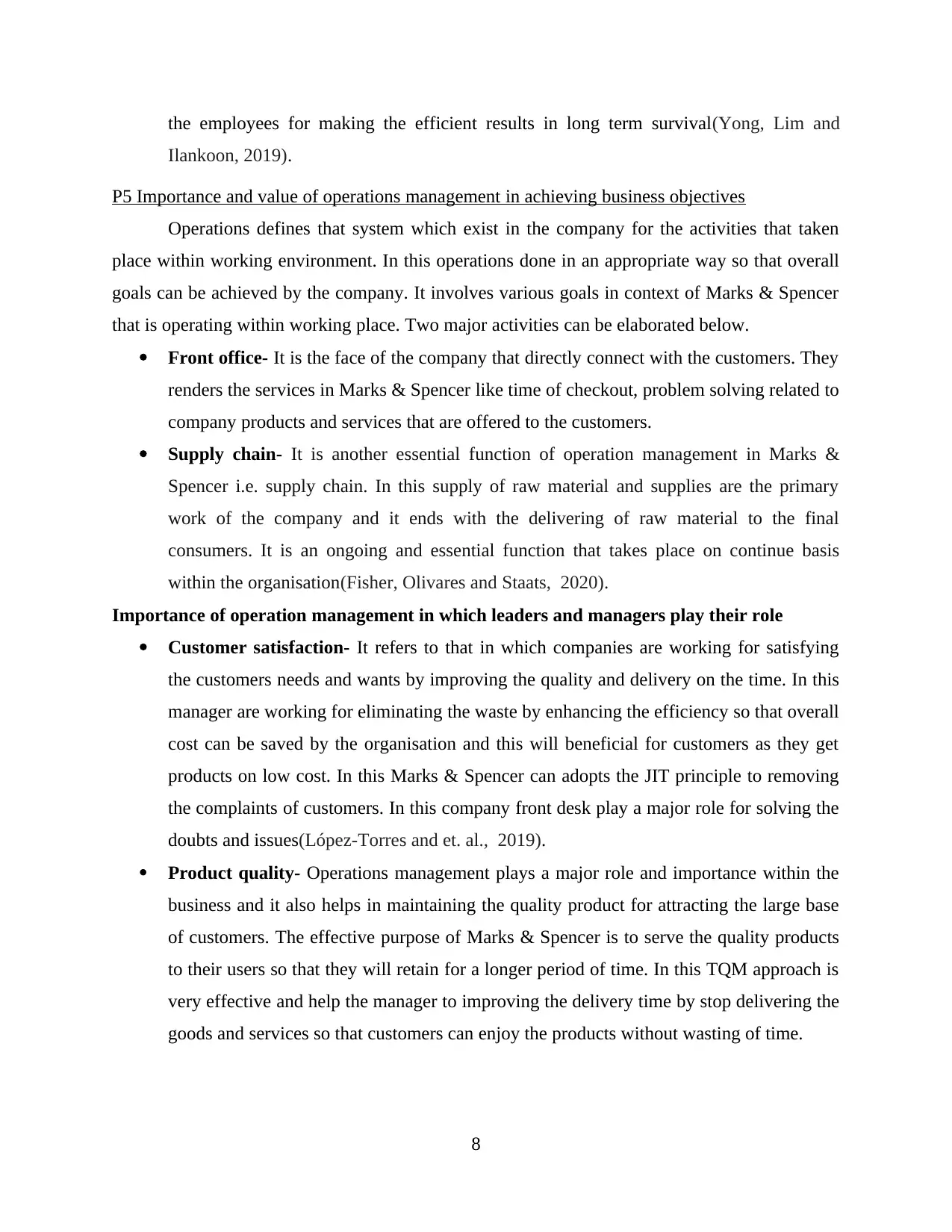
the employees for making the efficient results in long term survival(Yong, Lim and
Ilankoon, 2019).
P5 Importance and value of operations management in achieving business objectives
Operations defines that system which exist in the company for the activities that taken
place within working environment. In this operations done in an appropriate way so that overall
goals can be achieved by the company. It involves various goals in context of Marks & Spencer
that is operating within working place. Two major activities can be elaborated below.
Front office- It is the face of the company that directly connect with the customers. They
renders the services in Marks & Spencer like time of checkout, problem solving related to
company products and services that are offered to the customers.
Supply chain- It is another essential function of operation management in Marks &
Spencer i.e. supply chain. In this supply of raw material and supplies are the primary
work of the company and it ends with the delivering of raw material to the final
consumers. It is an ongoing and essential function that takes place on continue basis
within the organisation(Fisher, Olivares and Staats, 2020).
Importance of operation management in which leaders and managers play their role
Customer satisfaction- It refers to that in which companies are working for satisfying
the customers needs and wants by improving the quality and delivery on the time. In this
manager are working for eliminating the waste by enhancing the efficiency so that overall
cost can be saved by the organisation and this will beneficial for customers as they get
products on low cost. In this Marks & Spencer can adopts the JIT principle to removing
the complaints of customers. In this company front desk play a major role for solving the
doubts and issues(López-Torres and et. al., 2019).
Product quality- Operations management plays a major role and importance within the
business and it also helps in maintaining the quality product for attracting the large base
of customers. The effective purpose of Marks & Spencer is to serve the quality products
to their users so that they will retain for a longer period of time. In this TQM approach is
very effective and help the manager to improving the delivery time by stop delivering the
goods and services so that customers can enjoy the products without wasting of time.
8
Ilankoon, 2019).
P5 Importance and value of operations management in achieving business objectives
Operations defines that system which exist in the company for the activities that taken
place within working environment. In this operations done in an appropriate way so that overall
goals can be achieved by the company. It involves various goals in context of Marks & Spencer
that is operating within working place. Two major activities can be elaborated below.
Front office- It is the face of the company that directly connect with the customers. They
renders the services in Marks & Spencer like time of checkout, problem solving related to
company products and services that are offered to the customers.
Supply chain- It is another essential function of operation management in Marks &
Spencer i.e. supply chain. In this supply of raw material and supplies are the primary
work of the company and it ends with the delivering of raw material to the final
consumers. It is an ongoing and essential function that takes place on continue basis
within the organisation(Fisher, Olivares and Staats, 2020).
Importance of operation management in which leaders and managers play their role
Customer satisfaction- It refers to that in which companies are working for satisfying
the customers needs and wants by improving the quality and delivery on the time. In this
manager are working for eliminating the waste by enhancing the efficiency so that overall
cost can be saved by the organisation and this will beneficial for customers as they get
products on low cost. In this Marks & Spencer can adopts the JIT principle to removing
the complaints of customers. In this company front desk play a major role for solving the
doubts and issues(López-Torres and et. al., 2019).
Product quality- Operations management plays a major role and importance within the
business and it also helps in maintaining the quality product for attracting the large base
of customers. The effective purpose of Marks & Spencer is to serve the quality products
to their users so that they will retain for a longer period of time. In this TQM approach is
very effective and help the manager to improving the delivery time by stop delivering the
goods and services so that customers can enjoy the products without wasting of time.
8
Paraphrase This Document
Need a fresh take? Get an instant paraphrase of this document with our AI Paraphraser
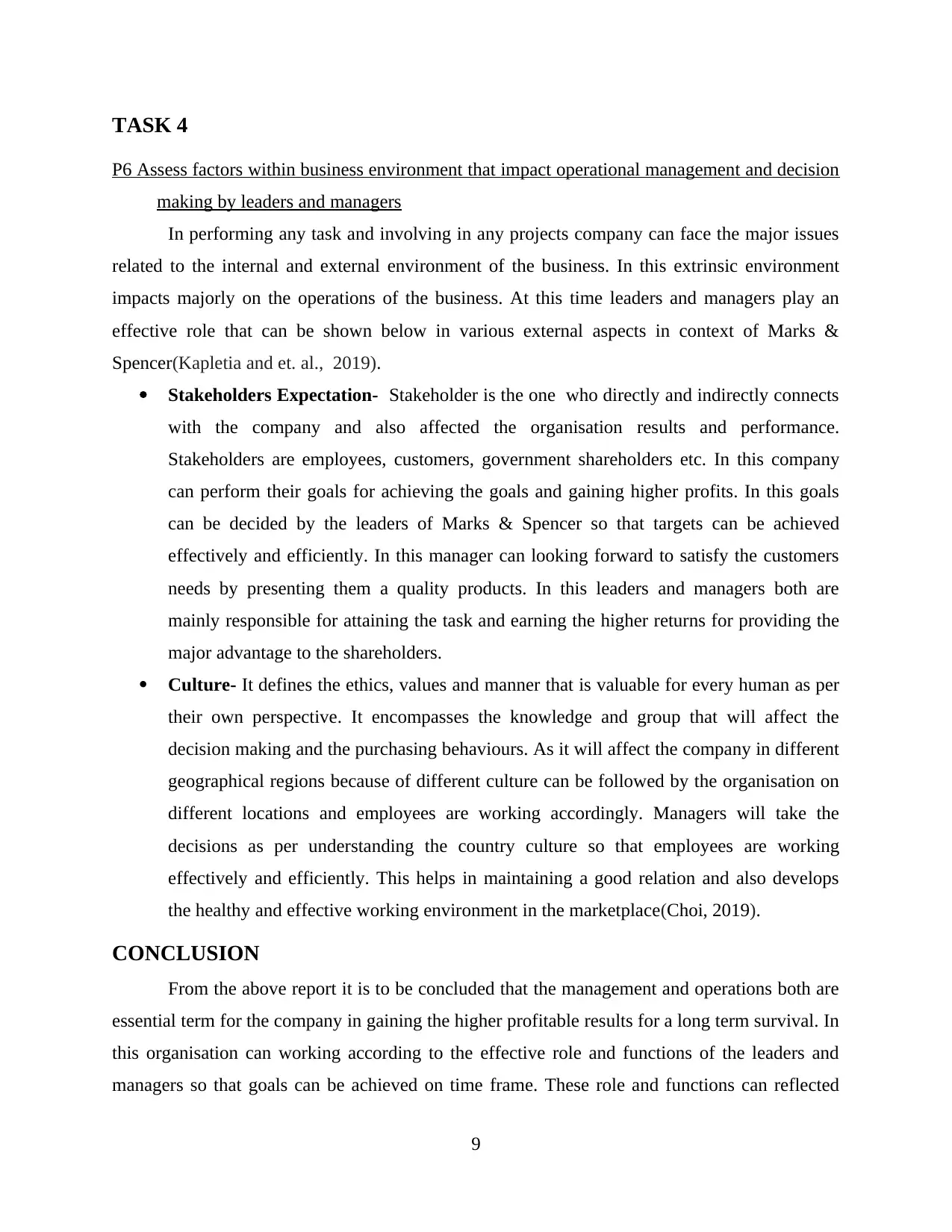
TASK 4
P6 Assess factors within business environment that impact operational management and decision
making by leaders and managers
In performing any task and involving in any projects company can face the major issues
related to the internal and external environment of the business. In this extrinsic environment
impacts majorly on the operations of the business. At this time leaders and managers play an
effective role that can be shown below in various external aspects in context of Marks &
Spencer(Kapletia and et. al., 2019).
Stakeholders Expectation- Stakeholder is the one who directly and indirectly connects
with the company and also affected the organisation results and performance.
Stakeholders are employees, customers, government shareholders etc. In this company
can perform their goals for achieving the goals and gaining higher profits. In this goals
can be decided by the leaders of Marks & Spencer so that targets can be achieved
effectively and efficiently. In this manager can looking forward to satisfy the customers
needs by presenting them a quality products. In this leaders and managers both are
mainly responsible for attaining the task and earning the higher returns for providing the
major advantage to the shareholders.
Culture- It defines the ethics, values and manner that is valuable for every human as per
their own perspective. It encompasses the knowledge and group that will affect the
decision making and the purchasing behaviours. As it will affect the company in different
geographical regions because of different culture can be followed by the organisation on
different locations and employees are working accordingly. Managers will take the
decisions as per understanding the country culture so that employees are working
effectively and efficiently. This helps in maintaining a good relation and also develops
the healthy and effective working environment in the marketplace(Choi, 2019).
CONCLUSION
From the above report it is to be concluded that the management and operations both are
essential term for the company in gaining the higher profitable results for a long term survival. In
this organisation can working according to the effective role and functions of the leaders and
managers so that goals can be achieved on time frame. These role and functions can reflected
9
P6 Assess factors within business environment that impact operational management and decision
making by leaders and managers
In performing any task and involving in any projects company can face the major issues
related to the internal and external environment of the business. In this extrinsic environment
impacts majorly on the operations of the business. At this time leaders and managers play an
effective role that can be shown below in various external aspects in context of Marks &
Spencer(Kapletia and et. al., 2019).
Stakeholders Expectation- Stakeholder is the one who directly and indirectly connects
with the company and also affected the organisation results and performance.
Stakeholders are employees, customers, government shareholders etc. In this company
can perform their goals for achieving the goals and gaining higher profits. In this goals
can be decided by the leaders of Marks & Spencer so that targets can be achieved
effectively and efficiently. In this manager can looking forward to satisfy the customers
needs by presenting them a quality products. In this leaders and managers both are
mainly responsible for attaining the task and earning the higher returns for providing the
major advantage to the shareholders.
Culture- It defines the ethics, values and manner that is valuable for every human as per
their own perspective. It encompasses the knowledge and group that will affect the
decision making and the purchasing behaviours. As it will affect the company in different
geographical regions because of different culture can be followed by the organisation on
different locations and employees are working accordingly. Managers will take the
decisions as per understanding the country culture so that employees are working
effectively and efficiently. This helps in maintaining a good relation and also develops
the healthy and effective working environment in the marketplace(Choi, 2019).
CONCLUSION
From the above report it is to be concluded that the management and operations both are
essential term for the company in gaining the higher profitable results for a long term survival. In
this organisation can working according to the effective role and functions of the leaders and
managers so that goals can be achieved on time frame. These role and functions can reflected
9
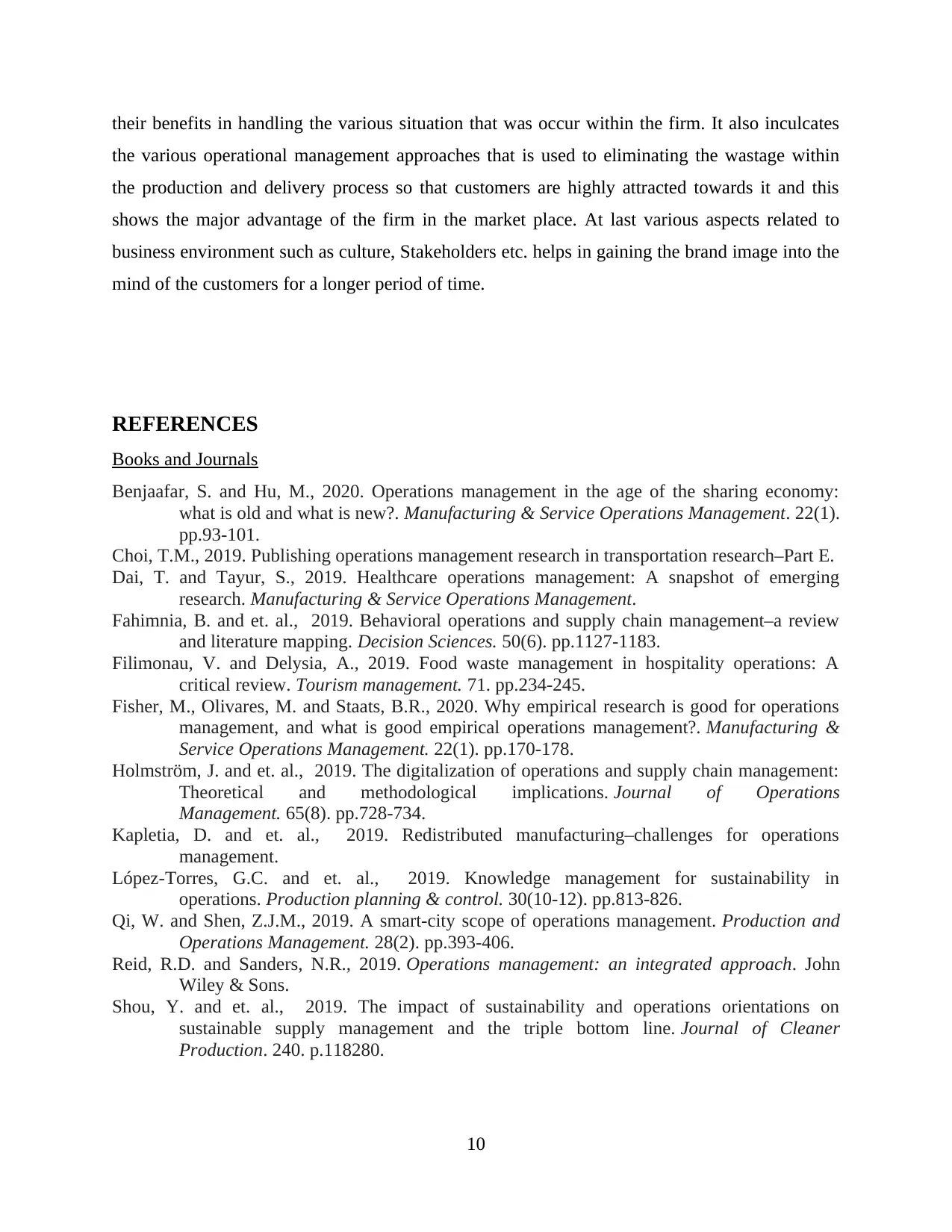
their benefits in handling the various situation that was occur within the firm. It also inculcates
the various operational management approaches that is used to eliminating the wastage within
the production and delivery process so that customers are highly attracted towards it and this
shows the major advantage of the firm in the market place. At last various aspects related to
business environment such as culture, Stakeholders etc. helps in gaining the brand image into the
mind of the customers for a longer period of time.
REFERENCES
Books and Journals
Benjaafar, S. and Hu, M., 2020. Operations management in the age of the sharing economy:
what is old and what is new?. Manufacturing & Service Operations Management. 22(1).
pp.93-101.
Choi, T.M., 2019. Publishing operations management research in transportation research–Part E.
Dai, T. and Tayur, S., 2019. Healthcare operations management: A snapshot of emerging
research. Manufacturing & Service Operations Management.
Fahimnia, B. and et. al., 2019. Behavioral operations and supply chain management–a review
and literature mapping. Decision Sciences. 50(6). pp.1127-1183.
Filimonau, V. and Delysia, A., 2019. Food waste management in hospitality operations: A
critical review. Tourism management. 71. pp.234-245.
Fisher, M., Olivares, M. and Staats, B.R., 2020. Why empirical research is good for operations
management, and what is good empirical operations management?. Manufacturing &
Service Operations Management. 22(1). pp.170-178.
Holmström, J. and et. al., 2019. The digitalization of operations and supply chain management:
Theoretical and methodological implications. Journal of Operations
Management. 65(8). pp.728-734.
Kapletia, D. and et. al., 2019. Redistributed manufacturing–challenges for operations
management.
López-Torres, G.C. and et. al., 2019. Knowledge management for sustainability in
operations. Production planning & control. 30(10-12). pp.813-826.
Qi, W. and Shen, Z.J.M., 2019. A smart‐city scope of operations management. Production and
Operations Management. 28(2). pp.393-406.
Reid, R.D. and Sanders, N.R., 2019. Operations management: an integrated approach. John
Wiley & Sons.
Shou, Y. and et. al., 2019. The impact of sustainability and operations orientations on
sustainable supply management and the triple bottom line. Journal of Cleaner
Production. 240. p.118280.
10
the various operational management approaches that is used to eliminating the wastage within
the production and delivery process so that customers are highly attracted towards it and this
shows the major advantage of the firm in the market place. At last various aspects related to
business environment such as culture, Stakeholders etc. helps in gaining the brand image into the
mind of the customers for a longer period of time.
REFERENCES
Books and Journals
Benjaafar, S. and Hu, M., 2020. Operations management in the age of the sharing economy:
what is old and what is new?. Manufacturing & Service Operations Management. 22(1).
pp.93-101.
Choi, T.M., 2019. Publishing operations management research in transportation research–Part E.
Dai, T. and Tayur, S., 2019. Healthcare operations management: A snapshot of emerging
research. Manufacturing & Service Operations Management.
Fahimnia, B. and et. al., 2019. Behavioral operations and supply chain management–a review
and literature mapping. Decision Sciences. 50(6). pp.1127-1183.
Filimonau, V. and Delysia, A., 2019. Food waste management in hospitality operations: A
critical review. Tourism management. 71. pp.234-245.
Fisher, M., Olivares, M. and Staats, B.R., 2020. Why empirical research is good for operations
management, and what is good empirical operations management?. Manufacturing &
Service Operations Management. 22(1). pp.170-178.
Holmström, J. and et. al., 2019. The digitalization of operations and supply chain management:
Theoretical and methodological implications. Journal of Operations
Management. 65(8). pp.728-734.
Kapletia, D. and et. al., 2019. Redistributed manufacturing–challenges for operations
management.
López-Torres, G.C. and et. al., 2019. Knowledge management for sustainability in
operations. Production planning & control. 30(10-12). pp.813-826.
Qi, W. and Shen, Z.J.M., 2019. A smart‐city scope of operations management. Production and
Operations Management. 28(2). pp.393-406.
Reid, R.D. and Sanders, N.R., 2019. Operations management: an integrated approach. John
Wiley & Sons.
Shou, Y. and et. al., 2019. The impact of sustainability and operations orientations on
sustainable supply management and the triple bottom line. Journal of Cleaner
Production. 240. p.118280.
10
⊘ This is a preview!⊘
Do you want full access?
Subscribe today to unlock all pages.

Trusted by 1+ million students worldwide
1 out of 13
Related Documents
Your All-in-One AI-Powered Toolkit for Academic Success.
+13062052269
info@desklib.com
Available 24*7 on WhatsApp / Email
![[object Object]](/_next/static/media/star-bottom.7253800d.svg)
Unlock your academic potential
Copyright © 2020–2026 A2Z Services. All Rights Reserved. Developed and managed by ZUCOL.





